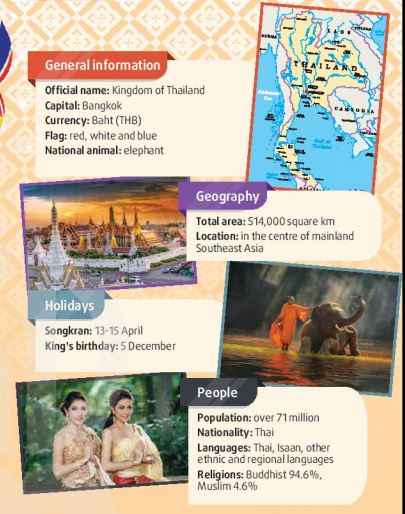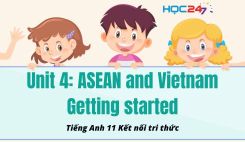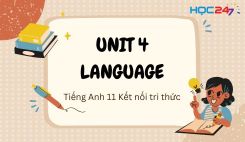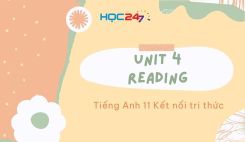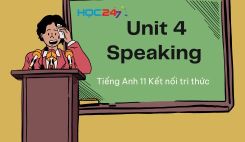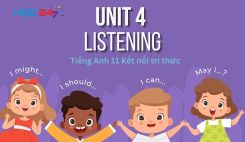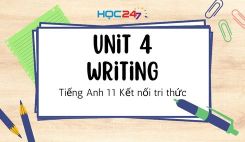Chủ đề " Sắc màu ASEAN " thuộc phần Unit 4 - Project Chương trình Kết nối tri thức Tiếng Anh 11 sẽ giúp các em tìm hiểu và sáng tạo áp phích, video hoặc trang trình bày về chủ đề sắc màu ASEAN. Chúc các em hoàn thành tốt dự án của mình với chủ đề hấp dẫn này nhé!
Tóm tắt bài
The colours of ASEAN
(Sắc màu ASEAN)
Work in groups. Find information about a member country of ASEAN. Present your research to the class. You can make a poster, a video, or presentation slides.
(Làm việc nhóm. Tìm thông tin về một quốc gia thành viên của ASEAN. Trình bày nghiên cứu của bạn trước lớp. Bạn có thể tạo áp phích, video hoặc trang trình bày.)
Think about the following points:
(Suy nghĩ về những vấn đề sau)
Ceneral information (name, capital, currency, national flag, national animal/flower)
Thông tin về quốc gia (tên, thủ đô, tiền tệ, quốc kỳ, động vật/hoa quốc gia)
Geography (area, location)
Địa lý (khu vực, vị trí)
Holidays (e.g. Independence Day. National Holiday)
Ngày lễ (ví dụ: Ngày quốc khánh. Ngày lễ quốc khánh)
People (population, culture, language(s) spoken, religions)
Con người (dân số, văn hóa, (các) ngôn ngữ được nói, tôn giáo)
Guide to answer
Located in Southeast Asia, Vietnam is a small and beautiful country with victorious history, profound patriotism and wonderful landscapes.
The Socialist Republic of Vietnam, widely known as Vietnam, is not a strange name to the whole world. Although this country is ravaged by a series of wars which cause serious damages, Vietnam in the eyes of the world is nice and peaceful. Vietnam is located in the eastern Indochina Peninsula in Southeast Asia, with Hanoi as its capital. With an area of 331,690 sq. kilometers, to the north of Vietnam is China, to the west is Laos and Cambodia, to the east is Gulf of Tonkin and East Sea, and to the south is Thailand Gulf. The land is a center of trading, cultural interaction, and even conflicts for centuries. It proves that Vietnam has an advantageous position in the region with long coastline and numerous attractions. Having a tropical climate, Vietnam is well known for from magnificent scenery and colorful hill tribes to wide terraced fields in Red River Delta and Mekong River Delta, to majestic mountains, and white sandy beaches. Vietnam, nowadays, is one of should-not-miss destinations in Asia.
Tạm dịch
Nằm ở Đông Nam Á, Việt Nam là một đất nước nhỏ bé và xinh đẹp với lịch sử hào hùng, tinh thần yêu nước sâu sắc và phong cảnh tuyệt vời.
Việt Nam xã hội chủ nghĩa, được biết đến rộng rãi là Việt Nam, không phải là một cái tên xa lạ với toàn thế giới. Mặc dù đất nước này bị tàn phá bởi một loạt các cuộc chiến gây thiệt hại nghiêm trọng, Việt Nam trong mắt thế giới vẫn tốt đẹp và yên bình. Việt Nam nằm ở phía đông bán đảo Đông Dương ở Đông Nam Á, với Hà Nội là thủ đô. Với diện tích là 331.690 km2, về phía bắc của Việt Nam là Trung Quốc, phía tây là Lào và Campuchia, phía đông là Vịnh Bắc Bộ và Biển Đông, và phía nam là Vịnh Thái Lan. Vùng đất này là một trung tâm thương mại, tương tác văn hóa và thậm chí là xung đột trong nhiều thế kỷ. Nó chứng tỏ rằng Việt Nam có một vị trí thuận lợi trong khu vực với đường bờ biển dài và nhiều điểm hấp dẫn. Có khí hậu nhiệt đới, Việt Nam nổi tiếng với phong cảnh tráng lệ và cảnh quan đồi núi đầy màu sắc cho đến những thửa ruộng bậc thang rộng lớn ở đồng bằng sông Hồng và đồng bằng sông Cửu Long, đến những ngọn núi hùng vĩ và những bãi biển cát trắng. Việt Nam, ngày nay, là một trong những điểm đến không thể bỏ lỡ ở châu Á.
Bài tập minh họa
Read the passage carefully and choose the correct answer.
Instructors at American colleges and universities use many different teaching methods. Some instructors give assignments every day. They grade homework. Students in their classes have to take many quizzes, a midterm exam, and a final text. Other' instructors give only writing assignments. Some teachers always follow a course outline and usually use the text book. Others send students to the library for assignments.
The atmosphere in some classrooms is very formal. Students call their instructors 'Professor Smith,' 'Mrs Jones,' and so on. Some teachers wear business clothes and give lectures. Other classrooms have an informal atmosphere. Students and teachers discuss their ideas. Instructors dress informally, and students call them by their first names. American teachers are not alike in their teaching styles.
At most American colleges and universities, facilities for learning and recreation are available to students. Students can often use type-writers, tape recorders, video machines, and computers at libraries and learning centers. They can buy books, notebooks, and other things at campus stores. They can get advice on their problems from counselors and individual help with their classes from tutors. Students can relax and have fun on campus, too. Some schools have swimming pools and tennis courts. Most have snack bars or cafeterias.
1. According to the passage, instructors at American colleges and universities .......
A. do not grade homework
B. never follow a course ouline
C. teach in their own ways
D. do not give students quizzes and exams
2. Which of the following statements is true?
A. American students can call their teachers by their first name..
B. The atmosphere in American classrooms is always relaxed and friendly.
C. American teachers are never allowed to dress informally.
D. The atmosphere in American classrooms is always formal.
3. The phrase 'business clothes' in the paragraph 2 can be understood as .......
A. clothes that only business people wear
B. trendy clothes
C. casual clothes
D. formal clothes
4. At most American colleges and universities, students can .......
A. buy anything they want at campus stores
B. ask their counselors and tutors for advice
C. use computers that are linked to libraries
D. have tutors and counselors solve their problems
5. According to the passage, which of the following statements is false about schools in America?
A. They are well equipped.
B. They have stores on campus.
C. They have no recreational facilities.
D. They offer sports and leisure facilities for students.
Luyện tập
3.1. Kết luận
Qua bài học này, các em đã có cơ hội tìm hiểu về đặc điểm về văn hóa và con người của các nước Đông Nam Á thông qua việc thiết kế tấm áp phích, lên ý tưởng, và trình bày trước lớp.
3.2. Bài tập trắc nghiệm Unit 4 - Project
Như vậy là các em đã xem qua bài giảng Unit 4 - Project chương trình Tiếng Anh lớp 11 Kết nối tri thức. Để củng cố kiến thức bài học mời các em tham gia bài tập trắc nghiệm Trắc nghiệm Unit 4 lớp 11 Kết nối tri thức Project - Dự án.
-
- A. didn't do
- B. not do
- C. don't do
- D. not to do
-
- A. difficult to make
- B. dificulty in making
- C. is difficult to make
- D. difficult making
-
- A. It's difficult for the family to get by on the money they have.
- B. It is difficult for them to earn money.
- C. The family could manage on the money they have.
- D. The family managed to earn enough money to live.
Câu 4-10: Mời các em đăng nhập xem tiếp nội dung và thi thử Online để củng cố kiến thức về bài học này nhé!
Hỏi đáp Unit 4 - Project Tiếng Anh 11
Trong quá trình học tập nếu có thắc mắc hay cần trợ giúp gì thì các em hãy comment ở mục Hỏi đáp, Cộng đồng Tiếng Anh HOC247 sẽ hỗ trợ cho các em một cách nhanh chóng!
Chúc các em học tập tốt và luôn đạt thành tích cao trong học tập!
-- Mod Tiếng Anh 11 HỌC247





